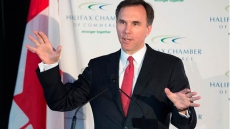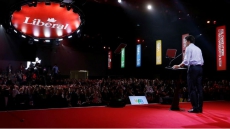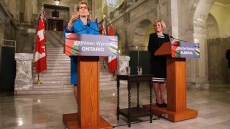OTTAWA — Between them, the three Syrian men gathered in an atrium at Ottawa's city hall on Thursday have 16 children. What none of them have is a job.
They say the pressure is mounting, though not only because of money. As five of the 15,412 government-assisted refugees resettled by the federal Liberals since November, they receive a year of income support and there's a while yet before that money runs out.
What is at stake right now is feeling like they belong in the country they are now calling home.
"It's getting depressing," said Mahmoud Al Ahmad, 46, through a translator. He worked as a long haul truck driver in his native city of Damascus, and has four kids now living in an east-end Ottawa apartment.
"The longer I stay at home, the sicker I feel."
Their children are in school, making new friends and settling in before their eyes, said Mohammed al Saltan, 31, who has seven kids and an eighth on the way.
"The children are busy, they are happy," he said. "We are just sitting around."
On a scorching June morning in Ottawa, they did do more than just sit.
Despite fasting for the Muslim holiday of Ramadan, the men were among 250 newly-arrived Syrians registered for a job fair put on by Refugee 613 — the Ottawa organization focused on helping the 1600 Syrians who have arrived in the nation's capital — along with another group that has worked for years helping newcomers find work.
The Syrian fair is unique, said Mengistab Tsegaye, executive director of World Skills. While some of the companies present have worked with his organization before, others are specifically interested in hiring Syrians to help. To line up the job fair, simultaneous translation for employers was required and child care services arranged so the women could come as well.
Then there was talking to Syrians about what to expect.
"When you tell people that there will be employers there, there is an expectation that they will come away with a job," Tsegaye said.
"We do have to manage that."
Ismail Mohammed, 31, who worked as a painter in Syria, said he expects it will take a great deal of time to land a job because he speaks very little English, yet.
"I'm willing to do anything, in any field," he said through a translator.

The translator was a Syrian refugee himself. Alaa Al Olaby, 29, came to Canada only a few months ago through a private sponsorship group. With his accounting degree and ease in English, he has rapidly picked up several jobs, including helping other Syrians settle in Ottawa.
"I'm passionate, I'm enthusiastic and I'm not waiting around," he said. "Everyone is trying to help themselves."
His skill set compared to those of the men he was shepherding around the job fair highlights the stark contrast between the two major streams of Canada's refugee resettlement program: privately sponsored and government assisted.
Statistics on the Syrian program show that around 60 per cent of the privately sponsored refugees speak English or French while more than 70 per cent of government assisted refugees speak neither.
That doesn't mean there aren't people willing to hire them. Employers at the job fair ranged from lawn and building maintenance companies, to health care providers to a staple of Ottawa's culinary scene, Kettleman's, known for its bagels.
General manager Maureen Mulroney sat at a table at the job fair with photographs of the company's baked goods spread out in front her. They are hiring bakers to support their company's expansion. She had already met several Syrians with professional baking experience and hopes to follow up with job offers.

"You don't need language to roll dough," she said. "It works for them and for us."


